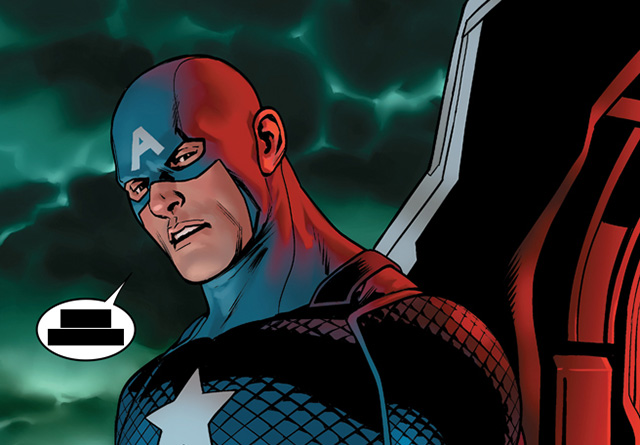Marvel Gives Steve Rogers Fans A Hail Of A Shock

I am fanatically opposed to spoilers. Like, at a deep-seated almost obsessive level. So it is with that said I want to make sure you readers understand that I still consider the news about what is contained in the premier issue of Captain America: Steve Rogers out today to be spoiler level. But it has to be discussed. Therefore, be warned that ahead will be spoilers — in the unlikely event that you haven’t seen this news.
In Captain America: Steve Rogers #1, writer Nick Spencer lays out throughout the course of the issue a history of Steve Rogers that nobody has ever known about, via flashbacks and memories of a Steve Rogers recently returned to youth from old age via the Cosmic Cube. The issue ends with Rogers confirming what we have all gathered up to this point — Captain America, the icon of American principles of liberty and equality, has been a Hydra sleeper agent all this time.
Just to be clear, Spencer said in an interview with EW.com that this is actually the Captain America that has been a member of the Avengers since he was rescued from a block of ice. “This is not a clone, not an imposter, not mind control, not someone else acting through Steve. This really is Steve Rogers, Captain America himself,” he is quoted in the article.
Now, I am not one to criticize a writer for taking a character through a challenging and difficult story arc. But I am not a fan of doing so solely for what I can only assume is marketing purposes. Nor am I confident that this isn’t yet another trick like the death of Captain America story arc.
In fact, Cap (Steve Rogers Cap, to be clear) has been a tool for driving marketing via shock value for years now. His death, his disappearance into the pocket universe created by Arnim Zola, his loss of the Super Soldier serum and sudden aging — all of it smacks of a Marvel editorial team that can’t imagine writing just straight forward superhero adventure stories for Steve Rogers.
Much like the problem DC has had for years with Superman, Marvel seems to think that a character known as the ultimate good guy can’t have a story in which he acts in that manner that anyone would want to read. So Steve Rogers has become a tool to drive sales via shock value — kill him (just kidding!), trap him in another universe (just kidding!), age him (just kidding!).
And there is no reason to think that, despite what Spencer says about this being the “real” Steve Rogers, that this story line won’t also end in a “just kidding!” moment. After all, it was the “real” Rogers that was killed, trapped, aged, etc. and he came back from all of them to his previous status. The same will in all likelihood happen to Hydra agent Steve Rogers.
Given that likelihood, this level of shock to the fans of the all-American bastion of freedom that is Steve Rogers seems like a slap in the face. “Let’s piss them all off and let them twist in the wind for maybe a year! Then we’ll reveal how he gets back to good ol’ Cap!”
There is one way that this could become something other than a crass and insulting marketing ploy. Spencer has to write the ever-living Hell out of this story and of Steve’s redemption. No “Sorry, it was Skrulls!” easy way out story resolutions. Alas, while I enjoyed his work on Ant-Man and Sam Wilson: Captain America, nothing in either of those titles indicates Spencer is capable of an astonishing writing feat. I mean an “oh, THAT”S what Hodor means!” level of surprising and quality writing.
I’ll read the story arc, because I like some of the themes Spencer says he will touch on (think Tom Cruise’s struggle in the movie Valkyrie) but I expect yet another “whoops, Skrulls!” type of resolution — or, more likely, “whoops, leftover from the multiverse collapse!” And if that is the case, this change to Steve Rogers will go down as one of the most crassly marketing driven changes to a superhero since the “Death of Superman.”



